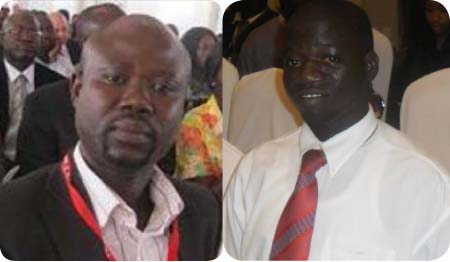
The two were charged with conspiracy to commit a felony and publication of false news with intent to cause fear and alarm to the public, which both men denied.
Delivering her ruling on the no-case-to-answer submission made by the defence counsel, the trial magistrate told the court that, by an amended charge sheet dated and filed on 21 January 2014, the accused persons were arraigned before the court on a two-count charge of conspiracy to commit a felony and publication of false news.
The accused persons pleaded not guilty to the two-count charge and the trial commenced, she said, adding that the prosecution called eight witnesses and tendered three exhibits in the course of the case.
At the close of the prosecution’s case, the magistrate continued, the defence counsel orally informed the court of his wish to make a no-case submission on behalf of both accused persons, which was granted.
The counsel made oral submission of his no-case plea and submitted a copy of one of the authorities he cited, whilst the prosecution opted to file a written address in reply to the no-case submission, but submitted no copies of the cases cited therein.
The defence counsel submitted that the application for a no-case-to-answer submission was premised under the criminal procedure code, and was made to the effect that the prosecution had failed to establish a prima facie case against the accused persons, hence enjoined the court to acquit and discharge the accused persons, the trial magistrate indicated.
She said the defence counsel further stated that the prosecution was required to establish the elements of the offence charged in both the “mens rea and the actus reus”, which they had dismally failed to do.
According to the magistrate, ASP Camara for the prosecution also submitted that based on count one, an agreement might be expressed or implied and stated that had there been no agreement between the 1st and 2nd accused persons, then there would not have been a publication in The Voice newspaper with the headline: “19 Green Youths from Tanji defected to UDP.”
If at the close of the evidence in support of the charge, it appeared to the court that a case was not made against the accused persons sufficiently to require him or her to make a defence, the court should as to that particular charge acquit him or her, the magistrate said.
The position of the law on when a no-case submission might be properly made and upheld was expressly stated.
“It has to be noted that at the stage where a no-case submission is made by learned counsel for the appellant, the issue is not whether the prosecution has/had proved the charge against the appellant beyond reasonable doubt, but whether a prime facie case has been made out by the prosecution against the appellant so as to make it necessary for the court to call on the appellant to open his defence to the charge,” Magistrate Hakim added.
It was not in dispute that there was a publication. However, the evidence adduced before the court with regards to both counts was neither direct nor circumstantial showing that the publication was false and that the accused persons conspired amongst themselves to publish it, she stated.
“Going by the above, I am of the view that the prosecution have failed to prove the essential ingredients of the offence on both counts as required by law,” she said.
“Hence, it is my view that the prosecution have failed to prove a prima facie case against the accused persons.
“I shall hereby acquit and discharge the accused persons on all the two counts,” the magistrate declared.


